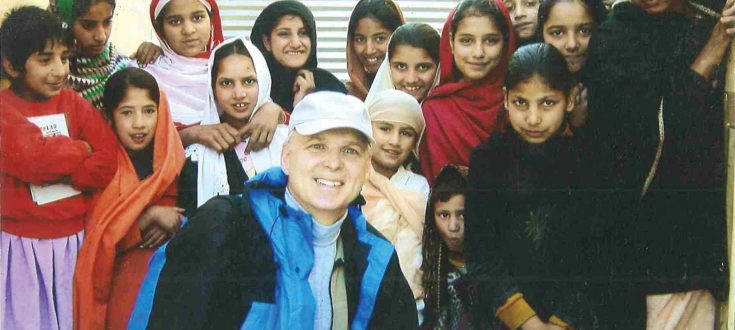Global Involvement and Cultural Competence | Q&A with Mike Hawkins

Michael Hawkins is a partner of the Labor & Employment and Appellate Practice Groups at Dinsmore & Shohl LLP, here he is a mediator and arbitrator. He has a strong passion for international humanitarian law as his interests expand through his involvement in the Red Cross, Refugees International, Sister Cities, and the World Affairs Council.
Michael joined our Board of Directors this past year and we are honored to have him as our Board Member of the Month. He along with the rest of the Board steer us towards a sustainable future by making sure our nonprofit has adequate resources to advance our impact to promote global competence in our community.
How did you discover the World Affairs Council and why did you stay involved?
It was a natural transition, through my long history in various organizations including Sister Cities, Chamber of Commerce, Red Cross, and Refugees International. Becoming a Board Member of the World Affairs Council – Cincinnati and Northern Kentucky is part of a continuing journey as a member of our global community.
The education efforts and cultural exchanges supported by the Council are an asset to our community to enhance creating a more welcoming and inclusive Cincinnati and Northern Kentucky Region. Everyone should be encouraged and interested in volunteering and participate in the programs supported and offered by the World Affairs Council.
What are your “go to” international news sources?
- BBC for information on people, music, food, politics, arts, and culture.
- Refugees International – A Powerful Voice for Lifesaving Action
- OCHA – United Nations Office for the Coordination of Humanitarian Affairs
When did your interest in other diverse cultures and humanitarian work begin?
This journey began for me as a young person with an interest in other cultures and geography. My Dad was in the Navy and served in World War II. He would return often with Japanese flags, dates, currency, and figs from the Mediterranean. I grew up surrounded by the Lithuanian language and culture, as my Mother’s family all lived in Lithuania, she would send care packages to her family.
My interest continued with a visit to South Africa after Apartheid was dismantled, a sister city visit to Moscow and Kharkiv in Ukraine, Red Cross missions and meetings in Vietnam, Cambodia, Ghana, Chile, Switzerland and Refugee International trips to Jordan, Kenya, Thailand, Pakistan and the Philippines.
Can you tell us a little more about your experience in South Africa?
In 1996, Judge Nathaniel Jones invited 20 people to travel to South Africa after the Apartheid was dismantled, as he knew the US Ambassador of South Africa at the time. My daughter who was 16 joined me on the trip. While there, we visited Johannesburg, Soweto, and the capital, Pretoria. We explored Kruger National Park, similar to the Grand Canyon in the U.S.
While visiting Atlantis, Western Cape in South Africa, there remained sites from apartheid such as the valleys around certain areas that were designed to help control unrest – oil was dumped into the ditches and lite on fire.
As a volunteer locally and globally of the American Red Cross, what experiences inspired you the most?
In 2002, I represented the American Red Cross as the Vice Chairman of the International Committee on a measles inoculation trip to Ghana. We visited villages and towns, set up stands and coolers while treating 7 million children with a shot and a vitamin tablet.
Can you tell us more about your work with Refugees International?
During a typical 10-day mission trip, we met with US Ambassadors, foreign ministry experts, military, and non-governmental organizations to discuss insights and data on immigration and migration in the country. Each country runs their refugee camps differently. For example, in Thailand, the camp is run by the local military. During our visits, we spoke with refugees and discussed issues of human trafficking and gender-based violence. We debriefed with camps on education and health opportunities for the refugee camps.
The refugee organization is the voice for the refugees. Another example I will mention was a visit that I made to the Philippines. Along the coast, there are fishing villages and many homes where people have lived for generations. Due to the high waters and typhoons, the government decided that these fishermen must move 100 yards away from their homes to the inland area. This displaced population were now expected to change jobs to work as farmers. As the voice, this advocacy group will write the appropriate white papers to the office of immigration to encourage other ways to engage local communities so that this scenario of displaced persons does not occur.
In the past you have hosted a variety of international visitors, how has this benefited your passion for diverse cultures?
These experiences give us the opportunity to explore our cultural differences and, as a result, to learn how we can each accept and adapt to each other’s cultures, aspirations, and needs. Too often we can only focus on our commonalities and neglect the opportunity to learn more by sharing and understanding. We can successfully accomplish mutual understanding and cooperation on basic humanitarian issues and more complex ones, such as global peace, the refugee crises, and efforts to create life, liberty, and happiness for all.
Through hosting visitors at the Council, I have met people from different races, ethnicities, religions, cultures and socioeconomic status and/or dire conditions. What can be learned by all these opportunities is that significant commonalities exist with other cultures such as love of family, education, health for their children and the hope for life, liberty and happiness.
To learn more about hosting international visitors in your home, go to our website.


